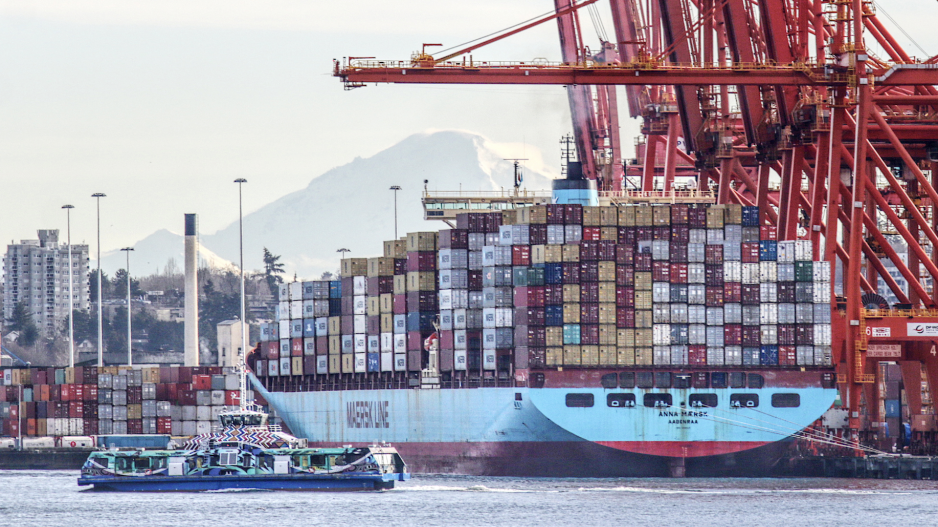World
B.C. Trade Deficit Worsens as Exporters Confront U.S. Challenges

The trade deficit in British Columbia has expanded, primarily due to a significant drop in forestry and energy exports. According to Bryan Yu, chief economist at Central 1 Credit Union, the province’s trade performance faced serious challenges in August 2023, attributed to increased U.S. tariffs and persistent global economic headwinds.
In August, British Columbia’s exports totaled approximately $2.5 billion, marking a 15% decrease compared to the same month last year. The decline in shipments from the forestry sector was particularly striking, with exports plummeting by 30%. This downturn is largely linked to the U.S. government’s decision to impose higher duties on softwood lumber, a critical product for the region.
Impact of U.S. Tariffs on B.C. Exports
The heightened tariffs are part of a longstanding trade dispute between Canada and the United States. The U.S. has maintained protective measures to safeguard its domestic lumber industry, significantly impacting Canadian exporters. The $1.2 billion drop in lumber exports from British Columbia underscores the severity of the situation. As a result, local manufacturers and producers are grappling with reduced access to one of their largest markets.
In addition to the challenges posed by U.S. tariffs, the global economic landscape has compounded difficulties for B.C. exporters. Factors such as fluctuating commodity prices, supply chain disruptions, and economic uncertainty in key markets have created an increasingly difficult environment for trade.
Future Outlook for British Columbia’s Trade
Looking ahead, the outlook for British Columbia’s trade remains uncertain. Exporters are urged to diversify their markets to mitigate the risks associated with reliance on the U.S. market. This shift is crucial as local businesses seek to navigate the complexities of international trade amidst evolving global conditions.
While some sectors may find opportunities in alternative markets, experts warn that the overall trade deficit could continue to widen if current trends persist. As Bryan Yu notes, the combination of high tariffs and external pressures could impede British Columbia’s economic recovery in the coming months.
In summary, British Columbia’s trade deficit has deepened due to a sharp decline in key exports, particularly in the forestry sector. The region’s exporters face significant challenges from U.S. tariffs and a volatile global market, prompting calls for strategic shifts to ensure future growth and stability.
-

 World3 months ago
World3 months agoScientists Unearth Ancient Antarctic Ice to Unlock Climate Secrets
-

 Entertainment3 months ago
Entertainment3 months agoTrump and McCormick to Announce $70 Billion Energy Investments
-

 Lifestyle3 months ago
Lifestyle3 months agoTransLink Launches Food Truck Program to Boost Revenue in Vancouver
-

 Science3 months ago
Science3 months agoFour Astronauts Return to Earth After International Space Station Mission
-

 Technology2 months ago
Technology2 months agoApple Notes Enhances Functionality with Markdown Support in macOS 26
-

 Top Stories1 week ago
Top Stories1 week agoUrgent Update: Fatal Crash on Highway 99 Claims Life of Pitt Meadows Man
-

 Sports3 months ago
Sports3 months agoSearch Underway for Missing Hunter Amid Hokkaido Bear Emergency
-

 Politics3 months ago
Politics3 months agoUkrainian Tennis Star Elina Svitolina Faces Death Threats Online
-

 Technology3 months ago
Technology3 months agoFrosthaven Launches Early Access on July 31, 2025
-

 Politics3 months ago
Politics3 months agoCarney Engages First Nations Leaders at Development Law Summit
-

 Entertainment3 months ago
Entertainment3 months agoCalgary Theatre Troupe Revives Magic at Winnipeg Fringe Festival
-

 Politics2 weeks ago
Politics2 weeks agoShutdown Reflects Democratic Struggles Amid Economic Concerns



















